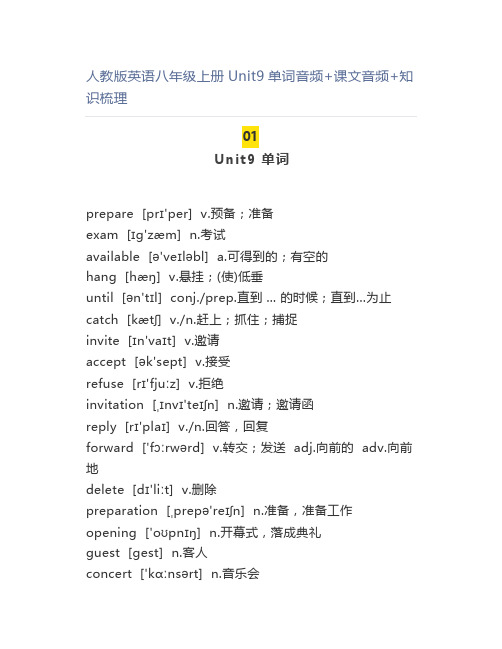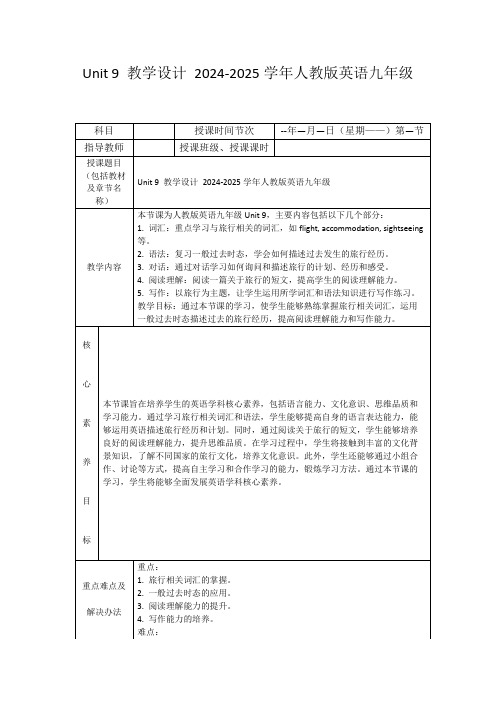旅游英语UNIT 9
旅游英语

UNIT 1 Chinese Culture 中国文化P1UNIT 2 Chinese Craftware 中国工艺UNIT 3 Chinese Festivals 中国节庆UNIT 4 A Tour of Landscape 山川游UNIT 5 A Tour of Waterscape 湖泊游UNIT 6 A Tour of Ancient Remains 古迹旅游UNIT 7 A Tour of Ancient Towns 古镇游UNIT 8 A Tour of Towers and Pavilions 楼阁游UNIT 9 A Tour of Temples 寺庙游UNIT 10 A Tour of Former Residences 故居游UNIT 11 A Tour of Memorials 纪念馆游UNIT 12 A Tour of Theme Parks 主题公园游UNIT 13 City Tours 城市游UNIT 14 Ethnic Tours 民族旅游UNIT 15 Travel Abroad 国外旅游WORDS AND PROPER NAMESUnit1 Chinese Culture 中国文化civilization n. 文明Great Wall 长城relic n. 遗迹、废墟Grand Canal 大运河compass n. 罗盘、指南针Dujiangyan Irrigation Project 都江堰水利工程heritage n. 遗产、继承权Terra-cotta Warriors and Horses 兵马俑Taoism n. 道教;道家学说Longmen Grottos 龙门石窟Buddhism 佛教Leshan Giant Buddha 乐山大佛Confucianism n.孔子学说、儒学Ji uzhigou Valley 九寨沟calligraphy n. 书法Mt. Lushan 庐山revere v. 敬畏、崇敬pagoda n. 宝塔antiquity n. 古代的遗物fascinating adj. 迷人的、醉人的Listening 1 An Old CivilizationChina, one of the four oldest civilizations in the world, has a (1)_______ history ......... 1.recorded 2. printing 3. 2,000 4. symbols 5.Confucianism 6. areas7. relics 8. art 9. fascinating 10. foreignWORDS AND PROPER NAMESdiversity n. 差异性philosophy n.哲学、哲学体系Christian adj. 基督教的sericulture n. 养蚕pluralism n. 多样性dominant adj. 占优势的、支配的worship v. 崇拜、尊敬division n. 分开、分裂transient adj. 短暂的、瞬时的Mongol 蒙古族人Manchu 满族人unification n. 统一;一致legacy n. 遗产outlive v. 比---长命,比---耐久tremendous adj. 极大的、巨大的asset n. 资产,有用的东西keenly adv. 敏锐的Listening 2 Mt. Taishan 泰山1. Chinese culture is a complete system,including its own philosophy, literature and paintings______________, medicine, technology and science as well as language and festivals......1. arts2. agriculture; 5,000 years3. pluralism4. roof; unification5. legacies; assetWORDS AND PROPER NAMESfeudal adj. 封建制度的ConfuciusTemple 孔庙acclaim v. 欢呼、称赞Qufu 曲阜regardless adj.不管、不顾Kong Qiu 孔丘archery n.箭术Most Holy and Foremost Perfect Teacher“大成至圣先师”humanitarian n.人道主义者、人文主义者The Analects of Confucius 《论语》orthodox adj. 正统的、传统的Bible 《圣经》benevolent adj.慈善的Saint Kong 孔圣人(A=Miss Wang Jing, a guide; B=John)Miss Wang Jing and John are traveling to the Confucius temple by coach. They are talking about the life story of Confucius, especially about his career as a teacher.A: Now we are on the way to the Confucius Temple in Qufu. We‟ll arrive there 20 minutes later. It is a fascinating cultural tour to Confucius‟s hometown. I believe you‟ll certainly learn a lot to the Chinese culture. ..........(T) Or (F)1. _________ The Confucius Temple is located in Qufu, Shanxi Province.2. _________ Kong Qiu was acclaimed as Saint Kong and highly respected by the emperors in feudal society.3. _________ Confucius was a teacher, but he only accepted the wealthy students.4. _________ Confucius was also a philosopher, and he mainly taught politics and philosophy.5. _________ Today‟s quality-education is based on the concept of all-round development education advocated by Confucius.1. F2. T3. F4. F5. TLadies and Gentlemen!Welcome to Chengdu, the capital of Sichuan! ........Part IV Tourism and Travel2. The basic geographic element of a travel includes___________.A. traveler-generating regionB. the transit route regionC. the destinationD. All of the above3. Which region represents the generating market and provides the “push” to stimulate and motivate travel?A. the destinationB. the origin regionC. the residenceD. the workplace4.Destination is important because it represents _________.A. the attractionsB. the facilitiesC. the imageD. the pull factor1. D2. D3. B4. D东岳泰山(1532米),位于山东泰安市。
新课标人教版八年级英语下册Unit 9 Have you ever been to an amuse

—So did Tina.
中国地图
蒂娜也去了。
—He has been a soldier for two years.
要点点拨
他已经当了两年兵了。
go inline skating 滑旱冰
—So have I.
我也是。
全析提示
3.Look at the map of the town.Listen and circle the places 助动词 have 和 has 可以与前面的
you hear.
主语缩略’ve 和’s。
看城镇的地图。听录音并圈出你听到的地方。
如:we’ve,they’ve,he’s,
water world 水上世界
it’s 等。
city library 城市图书馆
have not 常缩略为 haven’t,has
fun times amusement park
如果说“欢迎回家”该怎么说呢?
把 1a 中你的回答和你搭档的回答对照一下。
Wele back home!
4.For me,“I have to!” is number two.
对我来说“I have to!”是第二位的。
要点点拨
5.Listen to a teacher interview a student.Circle the newsletter 业务通讯;新闻信札
route“路线、小路、小巷”,使
The main attraction was a Charlie Chaplin film.
用 X 围也较小。course 表示船的
吸引人的主要是查理·卓别林的电影。
“航道”或飞机的“航线”。
The idea of being a teacher has little attraction to young
高教版ESAP旅游英语教程-电子教案Unit9

But the real question is …
From the point of view of …
In a case like this, ...
In terms of …
In the sense that …
In this sort of situation, …
That’s the reason why …
1 Match each picture with a quote. 2 What is each person’s connection with tourism? What aspects of tourism are they interested in?
D
a politician or government official (planning, regulation)
9.1 Vocabulary
D Read the extract on this page from the Hadford University handout about tourism in developing
countries.
1 Match the italic words in this extract with the definitions on the opposite page.
Vocabulary bank
Recognizing fixed phrases from academic English (2)
Make sure you understand these fixed phrases from general spoken
academic English.
As we shall see, …
旅游情境英语unit 9

Unit 9 Bid Farewell to the Guest
Basic Skill
Task One Checking out at a Hotel Situation: Sun Hui, a local English tour guide of the travel agency, is coming to the front desk in the hotel to check out for the tour group. And Mr. Taylor and Mrs. Johnson are two guests from this tour group. Task Two Delivering a Farewell Speech Situation: Sun Hui, a local English tour guide of the travel agency, is on the way to the airport. He is delivering a farewell speech to the tour group on the coach. Then he will collect the feedback forms which he asked the guests to fill out yesterday.
Unit 9 Bid Farewell to the Guest
7. Before the tour group leave the hotel, unless there are _s_p_e_c_ia_l___ reasons, the local guide should check out before noon 12:00
complicated security inadequacy article
旅英复习题(U9-10)

《旅游英语》复习试题(Unit9-10)姓名____________Part I Choice1. 道歉(动词)A .delay B. apologize C. apology D. attitude 2. 时间表A. scheduleB. sheetC. receiptD. console 3.折扣A .bargain B.discount C.lower price D.delicate 4. 随意A. tightB. botherC. chargeD. random 5. 发票A.ID cardB. ticketC. receiptD. note 6.投诉(名词)A. complainB. consoleC. settleD. complaint 7.收银员A .casher B. attendant C. reservationist D. cashier 8.服务态度A. service styleB. service firstC. service attitudeD. service charge 9. 员工A.staffB.managerC. guestD. tourist 10. 洗手间A. bedroomB.living roomC. waiting roomD. washroom 11.交流A.attentionmunicationC.patienceD. cooperation 12.告别A.biddingB. greetingC.farewellD. journey 13. 信用卡A .in cash B. ID card C. receipt card D. credit card 14.离店A .check in B. check out C. leave for D. departure date 15. 账单A. invoiceB.paymentC. flightD.bill 16. 机场A. train stationB. airportC. flightD. trip 17. 文化A .history B.chance C. culture D.duty Part II DialoguesA: tour guide B: tourists C: cashierA:Good morning, everyone.______________________. Is everybody here? B:Yes.A:Are you sure nothing is left behind? B:Yes, we are sure.A:Good. The bellboy will take your luggage to the bus. We will set off to the airport at nine.____________________________________________. B:Thank you.(To the front desk )C:Good morning, sir. Do you want to check out?A:Yes, our rooms are from204 to 212. My name is Wu Bing.C: This is your bill._________________________________, right? A:Yes, I think that’s right.C: _______________________________? In cash or by credit card? A: I’d like to pay in cash.C: Here is your receipt. Thank you for staying in our hotel.___________________________. Part III True or False( ) 1. You should give some explanations to your guests with feelings.( ) 2. As a guide, you should promise that the guests arrive at the airport with safety. ( ) 3. In order to settle a complaint, the guide should remain calm, polite and responsible.( ) 4. As a guide, you should not check back with the guests to see if their problems are actually solved totheir satisfaction.( ) 5.As a guide, it is duty to remind the guests if they leave something behind before checking out. ( ) 6.Before sending the guests to the airport, it is wrong to count the number of the guests. Part IV Structure and Vocabulary2. I _____________ to my mother that I went home late.3. It’s very kind of you to_______us________.4. The shoes are ___________. I can’t afford it.5. Something made me __________ during my staying in the hotel.6. I _______________________ your explanation.7. How many pieces of luggage do you want to _________. 8. Some children are full of __________about their food.9. You are not___________if you expect a child to do something like a grow-up. 10. It’s 900 Yuan RMB ______________ Part VI Translation 1.您有特殊的要求吗?2.给您带来的不便,我深感歉意。
八年级英语下册Unit9Haveyoueverbeentoanamusementpark词汇详细用法人教新目标版

Unit 9 Have you ever been to an amusement park ?68页1.amusement [ u ] 娱乐、消遣an amusement park 游乐场Have you ever been to an amusement park? 你曾经去过一个游乐场吗?Fun Times Amusement Park 欢乐时光游乐场。
复习have been to 去过,回来了have gone to 去了,现在不在这里have been in 去了,还在那里2. neither① adj. pron 二者都不Neither answer is correctNeither of the answers is / are correct.Which do you like? Neither I think they’re both ugly.② adv. 也不I don’t know. Me neither. I don’t know, either.70页3. Disneyland 迪斯尼乐园(前无冠词)Have you ever been to Disneyland?In fact, there are now several different Disneyland amusement parks around the world. 事实上,现在世界上有好几处不同的迪斯尼游乐场。
around the world = all over the worldacross China = all over China4. Mickey Mouse 米老鼠5. Donald Duck 唐老鸭6. character①性格I know his character very well.②汉字Chinese characters③人物、角色famous characters from Chinese historyDisney characters 迪斯尼人物Mickey Mouse and Donald Duck are famous Disney characters.7. seen see的过去分词。
人教版英语八年级上册Unit9单词+课文+知识梳理

人教版英语八年级上册Unit9单词音频+课文音频+知识梳理01Unit9 单词prepare [prɪ'per] v.预备;准备exam [ɪɡ'zæm] n.考试available [ə'veɪləbl] a.可得到的;有空的hang [hæŋ] v.悬挂;(使)低垂until [ən'tɪl] conj./prep.直到 ... 的时候;直到…为止catch [kætʃ] v./n.赶上;抓住;捕捉invite [ɪn'vaɪt] v.邀请accept [ək'sept] v.接受refuse [rɪ'fjuːz] v.拒绝invitation [ˌɪnvɪ'teɪʃn] n.邀请;邀请函reply [rɪ'plaɪ] v./n.回答,回复forward ['fɔːrwərd] v.转交;发送 adj.向前的 adv.向前地delete [dɪ'liːt] v.删除preparation [ˌprepə'reɪʃn] n.准备,准备工作opening ['oʊpnɪŋ] n.开幕式,落成典礼guest [ɡest] n.客人concert ['kɑːnsərt] n.音乐会headmaster [ˌhed'mæstər] n.校长event [ɪ'vent] n.大事,公开活动calendar ['kælɪndər] n.日历,日程表02U n i t9课文03U n i t9知识梳理Unit9. Can you come to my party?【重点短语】1、on Saturday afternoon 在星期六下午2、have to 必须3、 prepare for 准备4、go to the doctor 去看病5、have the flu 患流感6、help my parents 给父母帮忙7、come to the party 参加晚会8、meet my friend 见朋友9、go to the party 参加晚会10、too much homework 太多的家庭作业11、go to the movies 去看电影12、another time 下次,另外的时间,别的时间13、last fall 去年秋天14、hang out 闲逛15、after school 放学后16、on the weekend=on weekends 在周末17、study for a test 备考18、visit grandparents 拜访爷爷奶奶19、the day before yesterday 前天20、the day after tomorrow 后天21、have a piano lesson 上钢琴课22、look after 照看23 make an invitation 制定邀请24、accept an invitation 接受邀请turn down (refuse) an invitation 拒绝邀请25、take a trip to Wuhan 去武汉旅游26、at the end of this month 在本月底27、look forward to + doing 期望/渴望28、the opening of… 开幕/开业29、reply in writing 写回信30、go shopping 购物31、do homework 做作业32、go to the concert 参加音乐会33、not…until… 直到......才......【重点句型】1. --Can you come to my party on Saturday afternoon?星期六下午你能参加我的晚会吗?--Sure, I’d love to. / Sorry,I can’t. I have to prepare for an exam.当然,我愿意去。
Unit9教学设计2024-2025学年人教版英语九年级

科目
授课时间节次
--年—月—日(星期——)第—节
指导教师
授课班级、授课课时
授课题目
(包括教材及章节名称)
Unit 9教学设计2024-2025学年人教版英语九年级
教学内容
本节课为人教版英语九年级Unit 9,主要内容包括以下几个部分:
1.词汇:重点学习与旅行相关的词汇,如flight, accommodation, sightseeing等。
问题:
1. What was the traveler amazed by when they visited Japan?
2. What historical town did they visit?
3. What traditional activities did they experience?
详细介绍Unit 9的各个部分或功能,使用PPT帮助学生理解。
3.阅读理解案例分析(15分钟)
目标:通过具体案例,让学生深入了解阅读理解的特性及其重要性。
过程:
分析本节课的阅读理解材料,介绍其背景、特点和意义。
引导学生思考阅读理解对英语学习的影响,以及如何应用阅读理解技巧解决实际问题。
4.学生小组讨论(10分钟)
过程:
开场提问:“你们知道什么是旅行吗?它与我们的生活有什么关系?”
展示一些关于旅行的图片或视频片段,让学生初步感受旅行的魅力或特点。
简短介绍旅行的基本概念和重要性,为接下来的学习打下基础。
2. Unit 9基础知识讲解(10分钟)
目标:让学生了解Unit 9的基本概念、组成部分和原理。
过程:
讲解Unit 9的主题,包括其主要组成元素或结构。
- 1、下载文档前请自行甄别文档内容的完整性,平台不提供额外的编辑、内容补充、找答案等附加服务。
- 2、"仅部分预览"的文档,不可在线预览部分如存在完整性等问题,可反馈申请退款(可完整预览的文档不适用该条件!)。
- 3、如文档侵犯您的权益,请联系客服反馈,我们会尽快为您处理(人工客服工作时间:9:00-18:30)。
II. SITUATIONAL DIALOGUE
Pingwu Bao’en Temple
1. Study the Words And Proper Names. 2. Study the Language Tips Shown in This Dialogue. 3. Listen To Dialogue 1 And Decide Whether The Statements After The Dialogue Are True(T) OrFalse(F). 4. Listen To Dialogue 2 And Answer The Questions Listed After The Dialogue 5. Make Pair Task by Talking About Pingwu Bao’en Temple .
CONTENTS STUDIED
Listening 1 Temple of Heaven
PERIODS
I II III IV V VI Total
1 0.5 0.5 0.5 1 0.5 4
Reading Translation
Supplementary Reading Six Parts
Three Passages
English for Tourism and Travel
Unit Nine A Tour of Temples
Part I Lecture Time Assigned
PART MODULES
Listening Activities Listening 2 Situational Dialogue Class Presentation Tourism And Travel Consolidation Lingyin Temple Pingwu Bao’en Temple Baoguang Temple Tourism Resources Speaking
A: Good morning, everybody! It is a fine day, isn’t it? We’ve arrived at our destination, Pingwu Bao’en Temple. Do you see the ancient gate decorated with red bricks and green tiles? That’s the entrance of the temple. B: What a beautiful gate! I see the inscribed horizontal board with 9 dragon figures around it. The dragons look so lively as if they were flying into the sky. A: Yes, the dragon is one of the three wonders in the temple. When you enter the temple, you’ll see dragons everywhere. Some are carved, some are painted or inlaid; while others are cast or molded. The dragon figures appear on the beams, tiles, ridges, steles and in the yard; some even appear on bells, altars and incense burners. And there are 9,999 dragon figures in the temple. B: Amazing! I know the dragon is an auspicious figure in China. It is the Chinese totem. Chinese call themselves the offspring of dragons. A: I think you know a lot about the Chinese culture. Now, we are passing through the gate. On both sides of the gate, you’ll see statures of Heng and Ha. They are two ferocious guardians. You see, they keep their eyes wide open while they take the Buddhist implements in their hands. The little ghosts are trampled under their feet. B: Miss Ding, they look so terrible! You should have reminded me before we enter the temple. I’m just passing through the gate when you mention them. My heart jumped into my mouth! A: Don’t worry about them! They will not hurt you. The Chinese believe Heng and Ha have the magic power to protect the Buddhist doctrines. Look inside the gate! Each side of the gate stand more guardians with three heads and six arms or even four heads and eight arms. They are riding on the ferocious beasts, but with great dignity. B: My God! Don’t tease me! They are so terrible! I’ll certainly die hard. A: You’re kidding. They are guardians of the temple, and also guardians of tourists.
4. Fill in the Blanks of The Passages
The Text and Its Recording
Listening 1 Temple of Heaven
Listen to the passage twice and fill in the words or phrases you have heard from the tape. The Temple of Heaven was built in (1) __________ during the reign of Emperor Yongle of the Ming Dynasty. Situated in the southern part of the city, this grand set of structures(2) __________ an area of 273 hectares. To better symbolize heaven and earth, the (3) __________ part of the temple is circular while the southern part is square. The whole compound is enclosed by two walls, a (4) __________ wall outside a (5) __________ one. The outer area is characterized by suburban scenery, while the inner part is used for sacrifices. The inner (6) __________ consists of the Hall of Prayer for Good Harvest and the Circular Mound Altar. The Circular Mound Altar is the largest
The Text and Its Recording
Listening 2 Lingyin Temple
Listen to the tape twice. Identify and correct the mistakes in the passage. 1. Lingyin Temple is located in a long, narrow valley between Feilaifeng (Peak Flown from Afar) and North Peak to the southwest __________ of the West Lake at Hangzhou in Zhejiang Province. 2. The presence of a temple on this site can be traced back to the Eastern Jin Dynasty when, according to a foreign __________ legend, Huili, an Indian monk came to the area where he was inspired by the spiritual nature of the scenery here. 3. To his mind this had to be a dwelling of the immortals and so he gave the temple a nickname __________ “Lingyin” (Temple of the Soul’s Retreat) . 4. The Chinese name is translated into English as either “ Temple of the Soul’s Retreat” or “ Temple of Inspired Seclusion” for the place _________ has a quiet and beautiful grandeur that encourages a feeling of peace and for contemplation. 5. In its heyday, the temple comprised nine buildings, sixteen __________ pavilions and seventy-seven halls with over thirteen hundred rooms providing accommodation for over __________ three thousand monks. 6. The main structure of the temple that can be seen today is a result of the innovation ________ that was carried out in 1974. 7. The temple is notable as one of the eight ____________ most famous Buddhist temples in China.
